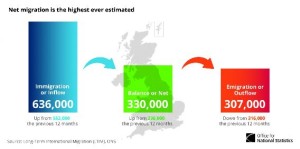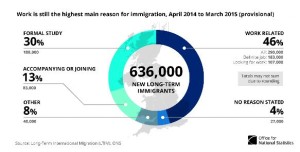British migration policy in the balance
Migration policy needs to be flexible and able to distinguish between cohorts of migrants, according to a leading British industry lobby group.
“A one-size-fits-all approach to migration won’t work and the UK government’s net migration target is not fit for purpose,” said Director-General of the Confederation for British Industry (CBI) John Cridland this week.
He was speaking in the wake of the latest figures which show UK migration has soared to a historic high of 330,000 a year.
In the year to March 2015, net migration to the United Kingdom rose by more than a third, compared to the previous 12 months.
Citizens from the European Union (EU) were responsible for the jump – their numbers rose to 269,000, which is the highest level ever recorded for this group.
 The number of non-EU nationals, by contrast, rose just 9 per cent to 284,000.
The number of non-EU nationals, by contrast, rose just 9 per cent to 284,000.
The UK’s ruling Conservative Party this year renewed its commitment to bring net migration down to fewer than 100,000 and the latest figures have been described as “deeply disappointing” by the government.
The UK Immigration Minister James Brokenshire said that while the government had reduced numbers of ‘bogus’ students entering the UK, British business was still reliant on foreign workers in a number of sectors.
Mr Cridland said the government should be careful not to limit skilled migration.
“While the government needs to deliver a managed immigration system, it’s important to distinguish between the different types of migration. Highly skilled workers, for example, bring huge benefits to the UK economy, helping to plug skills gaps in sectors that rely heavily upon science, technology, engineering and maths,” he said.
“The cap for skilled workers entering the U.K. has been breached every month since June this year, which means the government must look seriously at extending the number of visas available so British businesses can continue to access the skills they need to succeed,” Mr Cridland said.
The CBI and other bodies have expressed unease about skill shortages in the UK.
Institute of Directors (IOD) Director General Simon Walker said public debate on immigration needed to include the benefits accrued.
“There is a sensible and mature debate to be had about the costs and benefits of immigration. At the moment, however, the whole issue is being poisoned by the government’s adherence to their bizarre and unachievable net migration target. By announcing policies on the hoof every time figures are released, the Government betrays its lack of a long-term plan on migration,” he said.
Mr Walker said half of all IOD members employ somebody from outside the UK.
 “That is overwhelmingly because they value the different skills people from around the world bring to their business. This can help them enter new markets, expand global connections or just bring a fresh point of view to the table. It is not about undercutting wages or bringing in cheap staff,” he added.
“That is overwhelmingly because they value the different skills people from around the world bring to their business. This can help them enter new markets, expand global connections or just bring a fresh point of view to the table. It is not about undercutting wages or bringing in cheap staff,” he added.
The IOD has supported a call for a comprehensive immigration review, based on evidence and expert advice.
Director of the think tank ‘British Future’ Sunder Katwala said: “Having promised a 15-year low for net migration, David Cameron’s instead delivered an all-time high.”
“Unlike the long-term plan for economic recovery on which he was re-elected, his big problem on immigration is that the Prime Minister has never had a credible plan to meet this target,” Mr Katwala said.
A comprehensive review on immigration, with the involvement and engagement of the public, would be a positive step forward in what has become an emotional and increasingly divisive issue for business and the country as a whole, he said.
Skye Doyle
AMES Australia Staff Writer












